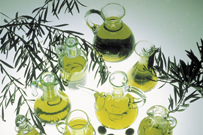

Health
OLIVE OIL FOR HEALTH
Natural olive juice:
the elixir of health and longevity. For centuries, the natural juice of olives, which has an ideal chemical structure and no extracts or refinements, has provided health and longevity for the Mediterranean people. Its alimentary, nutritional, and biological value is important; olive oil is among the 10 most beneficial foodstuffs.
Olive oil (like all oils) contains fatty acids, which may be saturated, monounsaturated, or polyunsaturated. Animal fats mainly contain saturated fatty acids; seed oils contain polyunsaturated mainly fatty acids. Olive oil contains mostly monounsaturated fatty acids (up to 83 percent in the form of oleic acid), few saturated fats, and basic polyunsaturated fats such as linoleic acid. The coexistence of the oleic acid with the linoleic and linoleic acids gives olive oil its unique biological value.
Natural antioxidizers:
In addition to fatty acids, olive oil contains small quantities of
other elements with beneficial properties, such as vitamins A and E,
minerals, selenium, and a heterogeneous class of polyphenolic substances
called antioxidizers. These antioxidizing substances protect cells from
oxidative stress, active oxygen, and free radicals. Free radicals substances
that can damage nucleic acids and proteins; they are considered factors
in chronic diseases such as cancer. The present survey deals with the
role of these microelements as protective factors against chronic diseases,
with a particular emphasis on cancer.
Olive oil and digestion:
Compared to other fatty substances, olive oil is the most tolerable for the human stomach. Olive oil can reduce gastric fluids, diminishing the feeling of indigestion. Moreover, it creates a feeling of satiety and aids in digestion. In one study, patients with ulcers who ate food prepared exclusively with olive oil reported reduced pain. Clinical research shows that olive oil has a high absorption capacity from the mucous membrane of the intestine. It alleviates many intestinal syndromes and supports the functioning of the large intestine while reducing symptoms of constipation. One or two spoonfuls of uncooked olive oil early in the morning are ideal for people who suffer from chronic constipation, or those who are pregnant, fasting, and or eating diet with a high proportion of protein.
 Olive oil and bile:
Olive oil and bile:
According to Chinary (1932), Touarte was the first doctor to officially recommend olive oil as treatment for cholelithiasis and hepatic colics in 1887. According to Chinary, olive oil is not capable of destroying or dissolving stones, but it promotes the excretion of bile. It is recommended that patients who suffer from bile, dyspepsia, or stomach aches take 1 to 2 spoonfuls of pure virgin olive oil flavoured with a few lemon drops each morning for 10 days a month.
Olive oil and skin:
Olive oil protects the skin from solar radiation due to the concentration of vitamins E and A as well as to its polyunsaturated fatty substances. Moreover, it suspends the development of children’s eczema and relieves insect bites. Research also shows that chlorophyll, found exclusively in olive oil, promotes metabolism, stimulates the growth of cells, and contributes to blood production, thus precipitating wound healing.
Olive oil and age:
Aging is a progressive process that comes with a series of biological changes that inevitably lead to death. Research in the past decade suggests that those who consume olive oil are protected from changes in the central nervous system and the brain, thanks to its antioxidizing properties.
Olive oil and cancer:
According to Dr. Trihopoulos of the Harvard School of Public Health, women who consume olive oil more than once daily reduce their risk of developing breast cancer by 25 percent. In the Mediterranean region, where olive oil consumption is high, there are lower rates of breast, ovarian, and endometrial cancer.
Olive oil, cholesterol, and the heart:
Over the last decade, epidemiologic studies (Seven Countries Study) concluded that olive oil protects the body from cardiovascular problems. The Mediterranean diet, especially for Cretans, includes plenty of fruits, vegetables, fish, and olive oil. Although red wine, the environment, and cultural beliefs might also play a role, the main source of protection appears to be olive oil. The prime cause of cardiovascular disease is not the total quantity of fat but the type of fat that a person consumers. The right combination of saturated and monounsaturated fats protects the heart.
Scientific interest in olive oil was rekindled by the realization that a high concentration of “good” cholesterol (HDL) is as important as a low concentration of “bad” cholesterol (LDL). Olive oil increases HDL and decreases LDL, thus building a very balanced lipid system in the blood and restricting the formation of fatty plaque along the artery walls, which develops into thrombus and can cause coronary heart diseases and myocardial infarctions.
In his study, Antonis Kafatos, Professor of Preventative Medicine and Nutrition in the University of Crete, found that men from Crete had the greatest ability to deal with fatty substances after a meal because of their olive oil consumption, which restricts the formation of thrombus, minimizing heart attack danger.
Olive oil and childhood development:
Adequate nutrition is especially important for infants and children. Lipid demands are greater in childhood. According to a rough estimate, breastfed children receive 50 percent of their total calories in the form of lipids, with a ratio of saturated to monounsaturated and polyunsaturated acids of 4:3:1 and with average cholesterol of 150 mg. Polyunsaturated fats comprise 8 to 10 percent of these lipids; 5 to 8 percent belong to the T3 series. The amount of lipids received later reduces to 30 percent in the later childhood years, until it adjusts to relative adult demands.
Infants should received fats in ratio of 4:3:1 for saturated, monounsaturated, and polyunsaturated fats, which is proportional to that of human milk. An experimental study concerning olive oil, sunflower oil, and saturated fats reports changes in the structural lipids of the brain and the liver of animals that are exclusively fed with sunflower oil. These changes prove that developing tissues demand an adequate quantity of basic fatty acids. Olive oil provides the fatty acids needed for the growth of newborns and has a glycerol composition that is similar to mother’s milk.
According to new studies, olive oil also benefits the growth and development of the central nervous system. Its monounsaturated oleic acid and linolenic acids can prevent high cholesterol levels. Furthermore, mothers who breastfeed and have large quantities of olive oil in their daily nutrition produce milk with excellent fatty acid content.
Olive oil and skeletal growth:
In 1980, Laval-Jeantet and his colleagues conducted a study on the role of lipids in the development of the human skeletal system. In this study, recently weaned mice were given foods whose lipids differed in terms of quantity and fatty acid composition. They found that lipids are of vital importance to the development of the skeleton: “the best development and the addition of mineral elements are observed in the case of taking oleic glycerids, which are complemented by the smallest quantity of polyunsaturated fatty acids, which mainly exist in olive oil.”
The same researchers discovered differences in bone size, breadth, and texture in people who consumed olive oil, concluding that oleic acid plays a major part in the development of bone tissue.
 Olive oil and athletics:
Olive oil and athletics:
Lipids and carbohydrates provide energy for physical activity. During rest and moderate activity, lipids form the main energy substratum; during intense activity, the carbohydrate contribution decreases. During lasting intense activity, lipid consumption gradually increases. Thus, athletes should consume a diet that is rich in fats. As far as energy output is concerned, no substantial differences have been found among the various fatty acids. However, some researchers claim that unsaturated fatty acids are better than saturated fats. Athletes should restrict their intake of animal fat, because the presence of saturated fatty acids combined with the existence of high cholesterol levels can lead to ischemic cardiopathy. The effects of lipid peroxidization and the reactions of the free radicals shouldn’t be underestimated, because they can even cause damage to the skeletal and cardiac muscles of athletes.
Athletes can restrict free radical development through a diet rich in fresh fruit and vegetables and monounsaturated fatty acids (olive oil). Lipids should comprise at least 30 percent of their total calories. Monounsaturated fatty acids are preferred, since they are not sensitive to peroxidization processes and do not create free radicals. Olive oil is preferred for its natural antioxidizing properties.
Olive oil and diabetes:
Olive oil plays an active role in keeping sugar levels low for insulin-independent diabetes patients. Consuming 30 to 45 percent of olive oil decrease lipoproteins A and B and triglyceride levels in the blood serum. Sintori (1986) claims that olive oil can slow down the emptying of the stomach’s content into the duodenum, so that carbohydrate digestion does not lead to sudden increases of glucose in the blood. Thus, olive oil leads to stable glucose levels and the inactivation of the liver neoglucogenesis mechanism.
OLIVE OIL CONTAINS NATURAL ANTIINFLAMMATORY AGENT
A naturally occurring chemical found in extra-virgin olive oils is a non-steroidal anti-inflammatory agent Named oleocanthal by the researchers, the compound inhibits activity of cyclooxygenase (COX) enzymes, a pharmacological action shared by ibuprofen.
The finding is significant because inflammation increasingly is believed to play a key role in a variety of chronic diseases. "Some of the health-related effects of the Mediterranean diet may be due to the natural anti-COX activity of oleocanthal from premium olive oils,"
The scientists were led to the discovery by the serendipitous observation that fresh extra-virgin olive oil irritates the back of the throat in a unique and unusual manner.
Taking their lead from the cues provided by olive oil's throaty bite, the scientists systematically evaluated the sensory properties of an unnamed chemical compound thought to be responsible for the throat irritating property of premium olive oils. When results confirmed that the irritating intensity of a given extra-virgin olive oil was directly related to how much of the chemical it contained, the researchers named the compound oleocanthal (oleo=olive; canth=sting; al=aldehyde).
To rule out the possibility that any other compound was involved, chemists created a synthetic form of oleocanthal identical in all respects to that found naturally in olive oil, and showed that it produced exactly the same throat irritation. They explained that only by de novo synthesis could they be absolutely certain that the active ingredient was oleocanthal.
The sensory similarities between oleocanthal and ibuprofen led scientists to investigate potential common pharmacological properties. Studies revealed that, like ibuprofen, oleocanthal inhibits activity of COX-1 and COX-2 enzymes. Because inhibition of COX activity underlies the anti-inflammatory actions of ibuprofen and other non-steroidal anti-inflammatory drugs (NSAIDs), the new findings suggest oleocanthal is a natural anti-inflammatory agent.
Scientists who directed the research remarks, "The Mediterranean diet, of which olive oil is a central component, has long been associated with numerous health benefits, including decreased risk of stroke, heart disease, breast cancer, lung cancer, and some dementias. Similar benefits are associated with certain NSAIDs, such as aspirin and ibuprofen. Now that we know of oleocanthal's anti-inflammatory properties, it seems plausible that oleocanthal plays a causal role in the health benefits associated with diets where olive oil is the principal source of fat."
They said future research will aim to identify how oleocanthal inhibits COX enzymes and how this is related to throat sting.
This study is the first to make the case for pharmacological activity based on irritation and furthers the idea originally proposed decades ago by Fischer that a compound's orosensory qualities might reflect its pharmacological potency.